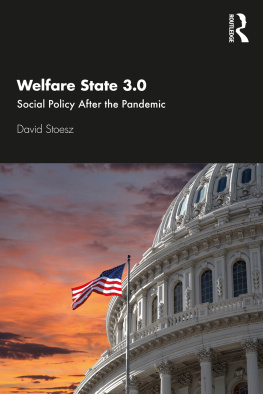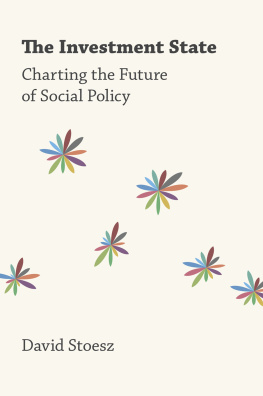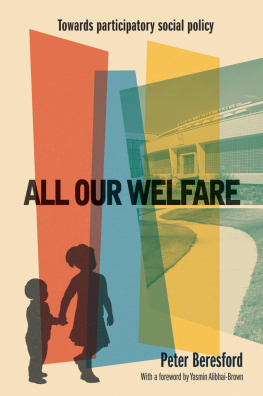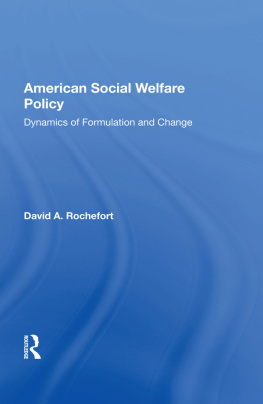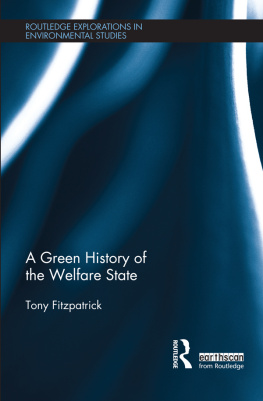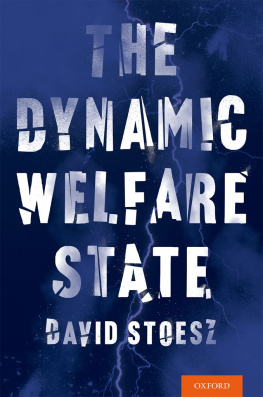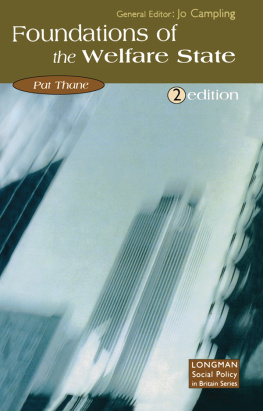Welfare State 3.0
This book identifies specific changes to bring U.S. social policy in accord with the Information Age of the 21st century, in contrast to the policy infrastructure of industrial America.
Welfare State 3.0: Social Policy After the Pandemic acknowledges the existing social infrastructure, considers viable options, and provides supporting data to suggest social policy reform by four strategies: consolidating programs, harmonizing applications, expanding equity, and conducting experiments. The book favors discreet, poignant proposals of social programs. In 12 chapters, the text provides an analysis that honors past accomplishments, recognizes the influence of established stakeholders, and concedes program inadequacies, while plotting specific opportunities for policy improvement. In contrast to liberalisms tendency toward idealism, the book adopts a realpolitik appreciation for social policy.
Written by one of the most respected academics of U.S. social policy, this book will be required reading for all undergraduate and postgraduate students of social policy, social work, sociology, and U.S. politics more broadly.
David Stoesz is founder and CEO, Up$tart, and a former Fulbright Distinguished Chair at the University of Birmingham and Carnegie Mellon University-Australia/Flinders University.
Welfare State 3.0
Social Policy After the Pandemic
David Stoesz
First published 2021
by Routledge
2 Park Square, Milton Park, Abingdon, Oxon OX14 4RN
and by Routledge
605 Third Avenue, New York, NY 10158
Routledge is an imprint of the Taylor & Francis Group, an informa business
2021 David Stoesz
The right of David Stoesz to be identified as author of this work has been asserted by him in accordance with sections 77 and 78 of the Copyright, Designs and Patents Act 1988.
All rights reserved. No part of this book may be reprinted or reproduced or utilised in any form or by any electronic, mechanical, or other means, now known or hereafter invented, including photocopying and recording, or in any information storage or retrieval system, without permission in writing from the publishers.
Trademark notice : Product or corporate names may be trademarks or registered trademarks, and are used only for identification and explanation without intent to infringe.
British Library Cataloguing-in-Publication Data
A catalogue record for this book is available from the British Library
Library of Congress Cataloging-in-Publication Data
Names: Stoesz, David, author.
Title: Welfare state 3.0: social policy after the pandemic / David Stoesz.
Other titles: Welfare state three point zero
Description: Abingdon, Oxon; New York, NY: Routledge, 2021. | Includes bibliographical references and index.
Identifiers: LCCN 2020055590 (print) | LCCN 2020055591 (ebook) | ISBN 9780367700393 (paperback) | ISBN 9780367700430 (hardback) | ISBN 9781003144342 (ebook)
Subjects: LCSH: United StatesSocial policy. | Welfare stateUnited States.
Classification: LCC HN65 .S74 2021 (print) | LCC HN65 (ebook) | DDC 306.0973dc23
LC record available at https://lccn.loc.gov/2020055590
LC ebook record available at https://lccn.loc.gov/2020055591
ISBN: 978-0-367-70043-0 (hbk)
ISBN: 978-0-367-70039-3 (pbk)
ISBN: 978-1-003-14434-2 (ebk)
Typeset in Adobe Caslon Pro
by Deanta Global Publishing Services, Chennai, India
Contents
Mary and her baby were on my caseload for three, maybe four, months. The case was diverted to me when another caseworker in our unit quit, so her cases were divvied up among the rest of us until a replacement could be hired and trained, six weeks with luck. Ordinarily, I had 72 cases, so the addition of another dozen was not welcome. I figured I could feather most of them, but Marys demanded immediate attention. Her previous caseworker noted shed given birth; but, aside from that notation, a visual confirmation was necessary, or the state would automatically terminate the case at months end.
At best, Mary could be delayed until the end of the week, when I could mail her the notification of a home visit and schedule a state car for the 30-mile trip to the city where my welfare families lived. Monday was a nightmare at the welfare department, the first day after a weekend of mayhem. The usual problems ran in patterns, with occasional surprises: a broken refrigerator (likely since the state supplied only second-hand appliances); a mother didnt get her child support; Tammy got pregnant; another nonfunctioning refrigerator; stolen food stamps; an adolescent sent to live with an out-of-state relative; Tyrone is in detention for joy-riding, but he didnt steal the car; a broken washing machine. My objective was to contain the chaos so home visits could be scheduled at the end of the week, the state requiring visual identification of each family member on welfare every six months.
Not that all of the news from welfare mothers was bad; typically, a bit of good news filtered through. Among those, I got a job! was most frequent, even if the conversation often took an unexpected turn:
With full time work at the minimum wage, along with your child support, your case would be closed, Id explain. Youre entitled to an Earned Income Disregard, so you could keep the first $30 and one-third after that, provided total family income didnt exceed the amount of the grant.
The what?
Earned Income Disregard.
But if my case is closed my kids will lose Medicaid?
Yes, but maybe your boss made a mistake in the number of hours youll be working.
Huh?
If you worked fewer hours your earned income plus child support would still be less than the grant, so you and your kids would still receive Medicaid. Maybe your boss misunderstood how much youd be working.
Uh, yeah, maybe he did. Thanks.
Rarely, a welfare mother would (re)marry someone with sufficient income to support the family. But even then problems lurked. In the poor neighborhoods served by our unit, most men already had child support orders, often for kids on welfare, so it was likely that the new spouse was already hemorrhaging income for child support, with some orders probably in arrears.
Anticipating the visit with Mary and her infant, I read her case record: childhood in a series of foster homes, two hospitalizations at the regional mental hospital (diagnosis: schizophrenia, depressive affect), then the pregnancy entitling her small family to cash assistance, Medicaid, and food stamps. For a single black woman not yet 20, her life trajectory was ominous.
Marys apartment was in a dilapidated wooden structure in a run-down neighborhood. I trudged up the stairs and knocked on the door, although my presence had probably been noted by the black state car and my state-issued black schedule book: the welfare. I heard shuffling from inside, the door cracked open, and I inquired, Mary Early? Without a word, she opened the door, a lithe figure standing aside, revealing a bleak studio, furnished courtesy of the state: one mattress on the floor, a clothes bureau, a kitchen table and two chairs, and a used refrigerator for her babys formula. Marys affect was muted, and her one-word responses suggested medication. She showed me the birth certificate; the baby seemed healthy, as I noticed the infants diaper clearing a clean streak across a filthy floor. And that was it, the visit lasting no longer than 15 minutes. I took notes for a later case dictation and departed for other home visits in more familiar parts of the town, somewhat relieved that Marys case would be transferred to the new worker in a few weeks.


